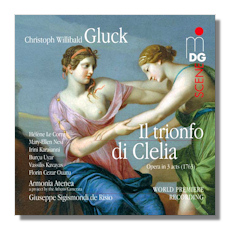
The Internet's Premier Classical Music Source
Related Links
- Gluck Reviews
- Latest Reviews
- More Reviews
-
By Composer
-
Collections
DVD & Blu-ray
Books
Concert Reviews
Articles/Interviews
Software
Audio
Search Amazon
Recommended Links
Site News
 CD Review
CD Review
Christoph Willibald Ritter von Gluck

Il Trionfo di Clelia
- Hélène Le Corre, Clelia (soprano)
- Mary-Ellen Nesi, Orazio (mezzo-soprano)
- Irini Karaianni, Tarquinio (mezzo-soprano)
- Burçu Uyar, Larissa (soprano)
- Vassilis Kavayas, Porsenna (tenor)
- Florin Cezar Ouatu, Mannio (counter-tenor)
Armonia Atenea/Giuseppe Sigismondi de Risio
Dabringhaus & Grimm MDG6091733-2 3CDs 195min
Christoph Williband Gluck (1714-1787) lived at a time when music was passing through an important transition: that from the baroque to the classical era. He was mainly an opera composer who revolutionized the genre, and whose influence was as far reaching as the times of Verdi and Wagner. Stage works such as "Orfeo ed Eurydice", "Alceste' and "Armide' are still performed regularly, but there is still much of his output that is either neglected or presumed lost.
This gem of an opera was unearthed quite accidentally by the conductor on this set, and now, thanks to MD&G's enterprising efforts, we can revel in the beauties of a work that we knew existed but whose score lay hidden in some remote drawer. Gluck composed this "opera seria' in 1763 for the new Bologna Theatre, and after its premiere, the work created wild enthusiasm whenever it was performed. Within a month more than 30,000 tickets were sold – a figure corresponding to more than half of Bologna's populace at the time – but a rich orchestral instrumentation and the outstanding new technical stage resources may have meant that the opera could never be performed in just the same way elsewhere. Consequently, "Clelia' fell into oblivion.
This recording is the first time in 250 years that the piece can be heard again in its first version. The libretto by Metastasio is set in ancient Rome, and contains all the ingredients that made 18th century opera such a success. Love, betrayal, unhappy suitors, abduction, violent battle scenes, godly interventions and a conciliatory conclusion celebrating the virtues and bravery of a very likeable Clelia all contribute to a very dynamic story full of opportunities for both composer and singers.
The lead roles of Clelia and Orazio are performed with breathtaking mastery and spectacular vocal pyrotechnics, but the rest of the ensemble are not far behind either. Indeed, there is a homogeneous sense of unity that exudes confidence and commitment from each soloist from the first recitative to the concluding chorus.
The Armonia Atenea playing on historical instruments give a superbly balanced rendition full of delicately-honed sounds and subtle tonal colours, while de Risio's remarkably heart-warming yet meticulous conducting has an irresistible momentum that keeps the dramatic action moving at a brisk pace. A mouthwatering issue that is both fascinating and revelatory. State of the art sound, notes and presentation complete a daring undertaking in the best MD&G tradition. Unreservedly recommended.
Copyright © 2012 by Gerald Fenech.





















